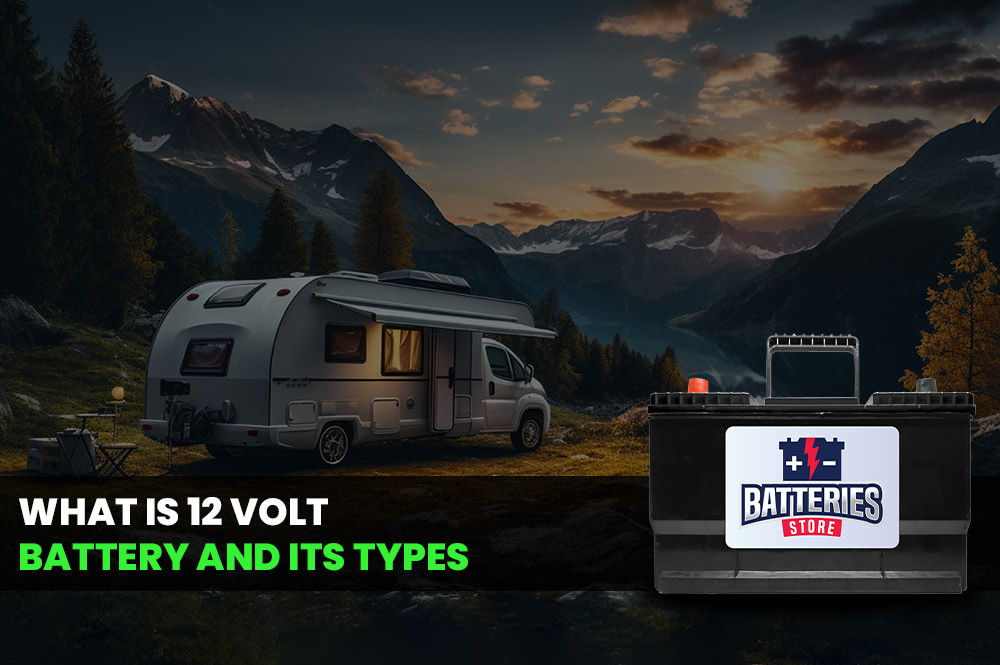What is 12 Volt Battery and Its Types

In the world of portable power, 12V batteries play a pivotal role, serving as essential components in various devices and applications. Whether you're an automotive enthusiast, an outdoor adventurer, or someone looking to power electronic devices off the grid, understanding the types and uses of 12V batteries is crucial. Let’s get into the basics of 12 Volt batteries, exploring their types and applications, with a focus on the needs of Canadians living in Calgary.
What is a 12 Volt Battery?
A 12V battery is a type of lead-acid battery that produces electrical energy through a chemical reaction. The term "12V or 12 volt" refers to the nominal voltage of the battery, which is the standard voltage for most automotive and recreational applications. These batteries are known for their reliability, affordability, and versatility, making them widely used across various industries.
Types of 12 Volt Batteries
1. Flooded Lead-Acid Batteries
These are the traditional and most common types of 12V batteries.
Consists of lead plates submerged in a liquid electrolyte.
Affordable but requires regular maintenance, including topping off the electrolyte and checking water levels.
2. Absorbent Glass Mat (AGM) Batteries
Feature a fiberglass mat soaked in electrolyte, which is sandwiched between the lead plates.
Maintenance-free and resistant to vibrations, making them ideal for off-road vehicles and marine applications.
Well-suited for cold weather conditions.
3. Gel Cell Batteries
Gel electrolyte replaces the liquid in these batteries, providing a more stable and leak-resistant option.
Ideal for deep-cycle applications, such as solar power systems and marine use.
Limited in terms of high-current discharges compared to AGM batteries.
Applications of 12V Batteries
1. Automotive Power
12V batteries are the standard power source for vehicles, providing the necessary energy to start the engine and power accessories.
2. Recreational Vehicles (RVs) and Boats
AGM and gel cell batteries are commonly used in RVs and boats for auxiliary power, running lights, appliances, and other electronic devices.
3. Off-Grid Power Systems
12V batteries are integral in off-grid solar power systems, storing energy for use during periods without sunlight.
4. Emergency Backup Power
Portable 12V batteries or jump starter packs are essential for emergency situations, providing a quick boost to a vehicle's battery.
5. Outdoor and Camping Equipment
From portable fridges to camping lights, 12V batteries power a variety of outdoor equipment for Calgarians who enjoy the wilderness.
How to Choose the Right 12V Battery?
Choosing the right 12V battery is crucial to ensure optimal performance and longevity for your specific application. Whether you're looking for a battery for your car, boat, RV, or a renewable energy system, there are several factors to consider.
1. Battery Type
Flooded Lead-Acid: Traditional and affordable, but requires regular maintenance.
AGM (Absorbent Glass Mat): Maintenance-free, ideal for applications with vibrations and colder temperatures.
Gel Cell: Leak-resistant, suitable for deep-cycle applications.
2. Application
Starting Batteries: Designed for vehicles, providing a burst of energy to start the engine. Choose a reliable and high-cranking amp (CCA) rating.
Deep-Cycle Batteries: Ideal for applications requiring a slow, continuous release of power, such as RVs, boats, and solar power systems.
3. Capacity (Ah)
Consider the battery's capacity, measured in ampere-hours (Ah). This indicates how much energy the battery can store.
Match the battery capacity to your specific power needs, ensuring it can handle the demands of your devices or equipment.
4. Voltage
Ensure the battery voltage matches the requirements of your application. Most standard applications use 12V batteries, but other voltage options exist.
5. Size and Dimensions
Check the physical dimensions of the battery to ensure it fits into the designated space in your vehicle or equipment.
6. Temperature Sensitivity
Consider the climate of your location. Some batteries, like AGM, perform well in cold temperatures, while others may be better suited for warmer climates.
7. Brand and Quality
Choose reputable brands known for producing high-quality batteries. Read reviews and seek recommendations to ensure reliability.
8. Cycle Life
For deep-cycle batteries, consider the number of charge and discharge cycles the battery can endure. Higher cycle life indicates better durability.
9. Charging Efficiency
Some batteries charge more efficiently than others. Consider how quickly the battery can recharge, especially in applications where downtime is a concern.
10. Warranty
A longer warranty period is often indicative of the manufacturer's confidence in their product. Check the warranty terms and conditions before making a purchase.
11. Budget
While quality is essential, consider your budget constraints. Compare prices of batteries with similar specifications and choose the one that offers the best value for your money.
12. Consult the Manufacturer's Recommendations
Always refer to the manufacturer's recommendations for your specific application. They provide valuable information on the ideal battery type, size, and maintenance requirements.
Conclusion
For Canadians residing in Calgary, where the weather can be unpredictable, having a reliable power source is essential. 12V batteries offer a versatile solution for a range of applications, from powering your car in cold temperatures to running camping equipment during outdoor adventures.
Are you ready to elevate your power game? Whether you're gearing up for a road trip, revving up your vehicle, or diving into off-grid adventures, the right 12V battery is your key to seamless power. Don't settle for anything less than optimal performance and reliability.
Visit Batteries Store in Calgary now and explore our extensive collection of high-quality 12V batteries.
Read Next Blog: